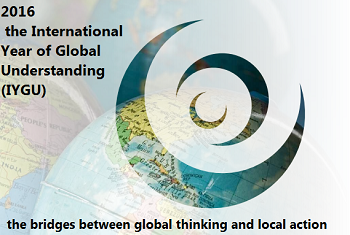by June Kaminski, RN MSN PhD(c)
 The International Council for Science (ICSU), the International Social Science Council (ISSC) and the International Council for Philosophy and Human Sciences (CIPSH) jointly declared that 2016 would be the International Year of Global Understanding (IYGU) – which officially began on February 2nd. “The International Year of Global Understanding (IYGU) addresses the ways in which we inhabit an increasingly globalized world.” (IGYU Program, 2016). A key aspect of this understanding is to examine how local actions and processes impact global ones. The immediate goal is to apply scientific know-how, research, and discussion to the development of sustainable communities and long-term use of resources. The long-term vision is to prepare people’s mindsets and catalyze research and scientific solutions to help 193 cooperative countries to work with the United Nations and other organizations to meet 17 Sustainable Development Goals by 2030.
The International Council for Science (ICSU), the International Social Science Council (ISSC) and the International Council for Philosophy and Human Sciences (CIPSH) jointly declared that 2016 would be the International Year of Global Understanding (IYGU) – which officially began on February 2nd. “The International Year of Global Understanding (IYGU) addresses the ways in which we inhabit an increasingly globalized world.” (IGYU Program, 2016). A key aspect of this understanding is to examine how local actions and processes impact global ones. The immediate goal is to apply scientific know-how, research, and discussion to the development of sustainable communities and long-term use of resources. The long-term vision is to prepare people’s mindsets and catalyze research and scientific solutions to help 193 cooperative countries to work with the United Nations and other organizations to meet 17 Sustainable Development Goals by 2030.
Global understanding is an important trait for all people living in the 21st century. Nurses can act as role models to help individuals, families, and communities develop their own global understanding. Nurses are in a unique position to facilitate new development both as activists and agents of change, and as guides/advocates for individuals, groups and communities working for change and social equity. Nurses can be key change-agents to spearhead new and innovative projects that address various health and social issues, and work with the people affected by these issues.
The IYGU initiative targets the following topical fields:
- Eating/Drinking//Surviving
- Moving/Staying//Belonging
- Working/Housing//Urbanizing
- Communicating/Networking//Interacting
- Wasting/Recycling//Preserving
- Sports/Entertaining//Recovering
Nurses can focus on any of these topical fields: for this article’s purpose, the Communicating/Networking or Interacting field will be addressed since this field is logically aligned with informatics. Nurses are intelligent, articulate, and caring individuals who already know how to approach issues from a wide-angle perspective. Their ability to holistically view a situation makes them prime candidates for effective activism for promoting global understanding. If nurses can learn to capitalize on the potential of technology and informatics, their ability to affect change and solutions will skyrocket.
One initiative that supports these points is the American Medical Informatics Association’s (AMIA) Global Health Informatics Community. “AMIA’s global health program (GHIP) and its international partners have formed a nascent learning community to support institutional stakeholders as well as a broad range of interested professionals. Initial institutional partners, including the Health Metrics Network administered by WHO, the International Medical Informatics Association, OER Africa, Intrahealth, and Open Health Tools, bring global expertise in health information systems and tools, education, and capacity building. In addition, individual participants represent leading experts in health informatics from across the globe. Together we seek to develop a staff that can provide the necessary administrative and operational support for maintaining a robust collaborative ecosystem for the learning community and its various communities of practice.” (AMIA, pgh. 10).
There are several ways that informatics can be harnessed to promote interaction and develop global understanding. Some examples are:
-
Sharing open software and working on unique solutions together that suit a variety of community structures and technological needs.
-
Mobile devices and apps for health are often the most used method of technological interaction, especially in developing countries. Partnerships to combine this familiarity with new apps and other solutions for data mining and analysis could improve the use of mHealth on a global scale.
-
Sharing best practices in electronic health data records, databases, and data analysis.
-
Sharing informatics-related expertise with international nurses and other health professionals (for instance system development, nursing education practices, simulation, telenursing, e-learning, decision support systems, artificial intelligence, and so on).
A well-established initiative that supports interaction and global development of informatics is the International Council of Nurses’ Telenursing Network. “The ICN Telenursing Network aims to seek, educate, support and collaborate with nurses and nurse supporters from across the globe who have an interest in telenursing and promote nursing involvement in the development and use of telehealth technologies, with the goal of improving the timeliness, quality and access of a broad range of health care services for individuals, their families, communities and countries.” (ICN, pgh. 1). This Network is a shining example of how informatics can be applied to support global understanding and communities of practice. I encourage more nurses to become involved with existing initiatives and spearhead new ones so that informatics becomes a strong avenue for global understanding this year throughout nursing communities.
More information on the IYGU can be found at: http://www.global-understanding.info
WANT TO LEARN MORE ABOUT NURSING INFORMATICS?





